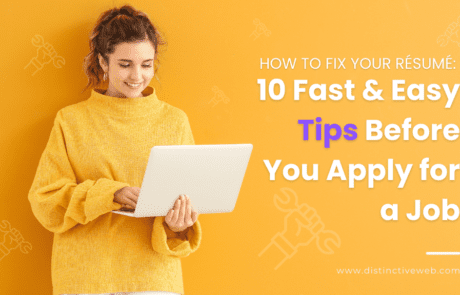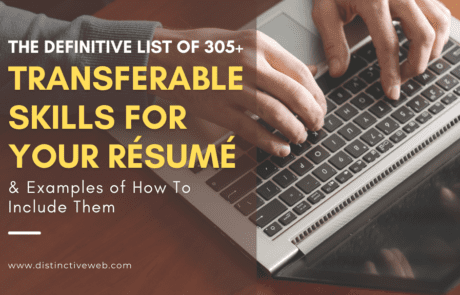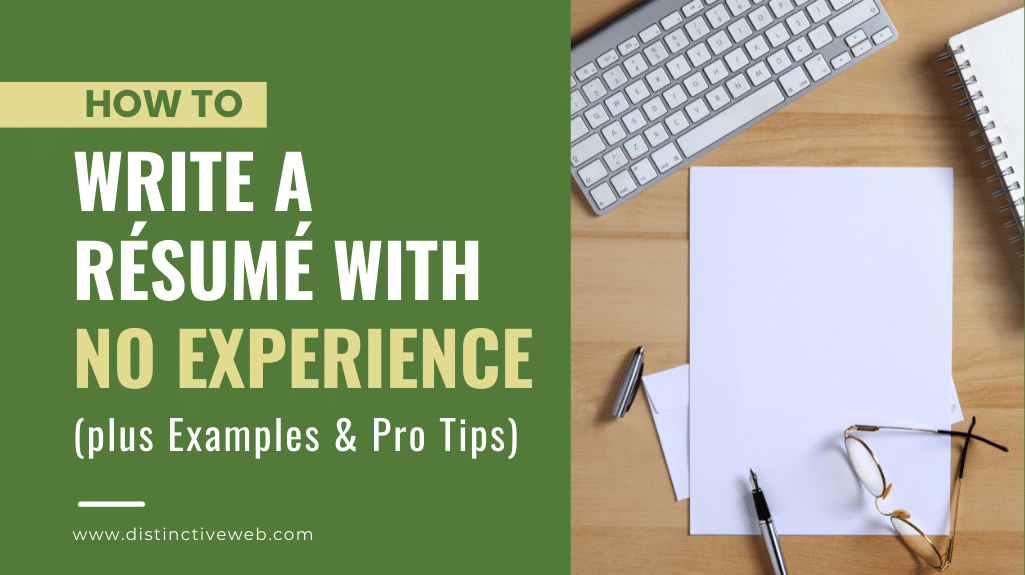
You’ve never had a resume before.
And you have no experience to put on your resume. At least, it seems that way.
Maybe you are one of the approximately one million high school graduates this year who decided to enter the U.S. workforce rather than go on to college. Or maybe you are one of the four million new college graduates this year and are looking for your first professional job. Another possibility is that you are making a career change and believe you have no experience (at least relevant experience) to include on your resume.
Whatever the reason, you don’t have a resume, and you haven’t needed one before.
But now you do.
And you have absolutely no idea where to start writing one.
Making A Resume with No Experience? The Classic Catch-22
It is the classic catch-22. You need a resume to get work experience. But you can’t (or, at least, you think you can’t) write a resume with no experience to put on it.
However, this simply isn’t true. You just need to remember that your resume is a marketing document.
A resume isn’t an autobiography, as many think of it.
It isn’t a laundry list of everything you’ve done in the past. And, it isn’t a backward-looking career obituary.
Instead, a resume is a forward-looking document that promotes how you are the best-choice new hire for a particular job opening.
Employers want to know that you can do the job and do it better than your competitors for the same position. They want to know that you can help them solve their problems, overcome their challenges, and meet their goals.
Most employers want to know how you can help them make money, save money, improve productivity or efficiency, attract new customers, strengthen relationships, etc.
When you reflect on it, you will realize that your ability to do these things comes from more than past work experience. Other life experiences give you the knowledge and skill to contribute to your employer. Whether or not you received pay for that experience (employment) doesn’t matter.
Your education, volunteer experience, extracurricular activities, internships, and sometimes even hobbies, all count too. These unpaid experiences provide you with valuable transferable skills you can call out on your resume.
Once you realize this truth – that you have value to add to an employer even if you gained that ability outside of employment experience – it makes the conundrum of how to write your first resume with no “experience” much easier. Here are some tips:
Start With Your Resume Focus
As the late resume guru Yana Parker used to say, “a resume without a job target is like a book without a title.”
Your resume needs to be targeted to be effective. If you don’t know what you want, and your job search target isn’t made clear in your resume, your reader won’t know what you want either, and they definitely won’t take the time and go to the trouble to figure it out.
The technique of including a resume objective section at the top of your resume is outdated. The more modern way of focusing your resume is to include a headline statement at the start of your resume summary, as shown in the image below.
Therefore, the first step to writing your resume is to decide what type of job you will be targeting with the resume, as specifically as possible.
Your second step is to learn what transferable skills, specific hard and soft skills, experience, and education are needed for this type of job.
Remember. Your resume isn’t about you. It is about what you can offer the employer.
The primary goal of your resume is to get you an interview for the type of job you are targeting. For this reason, everything you include in your resume should focus on this goal.
Your resume should NOT include everything you’ve done. Instead, it should include everything you’ve done that is relevant to your target position.
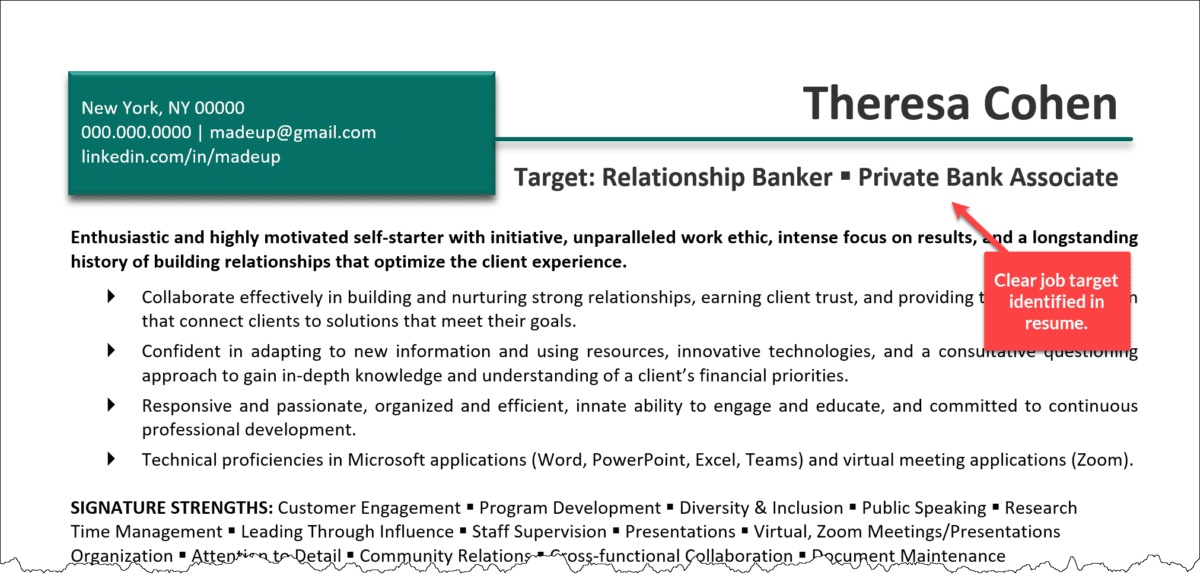
This example resume demonstrates a technique for setting the focus of your resume even if you have no prior work experience.
Here’s a pro tip for you. Type “jobs: (job title you are targeting)” into a Google search box. When you search, it will return a list of job openings related to your target job. Read through the job announcements for jobs that might interest you and note the required and desired qualifications as listed by hiring managers. On this list will almost always be a mix of technical skills and soft skills.
How has your education and other unpaid activities allowed you to develop the skills (both hard skills and soft skills) hiring managers seek? Where you developed the skill isn’t as important as the simple fact that you have it and ideally, have put the skill into practical use in some way. For example, perhaps you refined highly desirable soft skills such as teamwork and organizational skills through volunteer work, school projects, or even other personal projects. Find a way to note these skills on your resume. Hiring managers will value these skills regardless of where you developed them.
When you write your first job resume, these are the key skills and experiences you will want to focus on. And equally important is that you do not stuff your resume with irrelevant skills, as this will dilute your focus and detract from your candidacy. Tailor your resume to include relevant skills only.
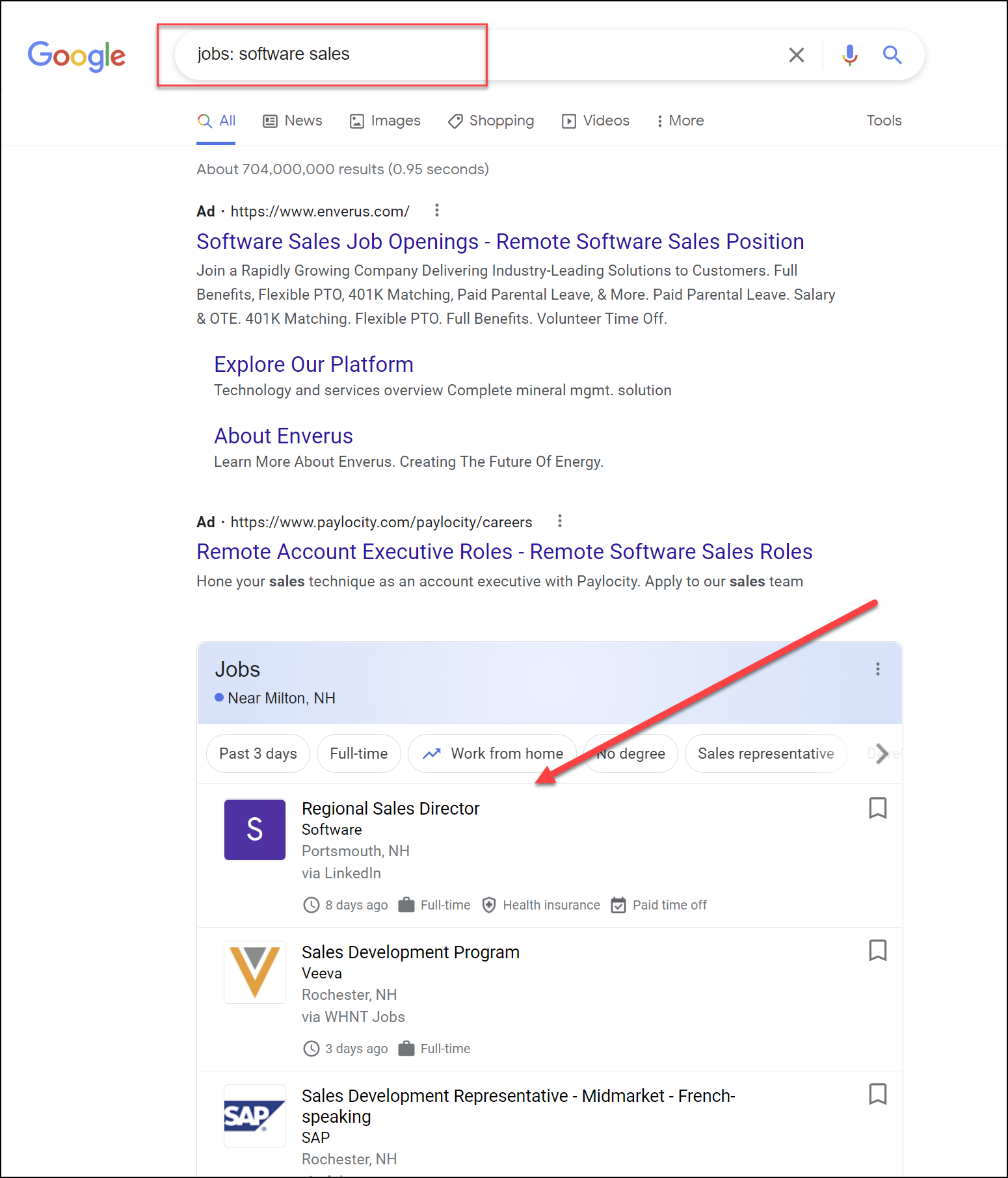
Try to put yourself in the shoes of the hiring manager for your target job. What will be interesting to them? What will convince them you have the hard and soft skills they seek and that you have value to offer as an employee?
If you get stuck on whether or not to include something in your resume, just come back to these questions and let your answers guide you.
Don’t Forget About Eye Appeal
Remember that first impressions matter, and how your resume looks plays a big role in that first impression. Although, of course, the content of your resume is what will ultimately convince the employer to call you, if your resume doesn’t catch attention in the first place, they may never see that content.
If you have no employment experience to put on your resume, you are relying 100% on your education, extracurricular activities, and volunteer work to make your case. If you present that using an eye-catching resume design, you will make an unbeatable first impression.
Just because it is your first job resume doesn’t mean it needs to look generic and boring to read.
While working with a professional resume writer is always the best option, if you decide to go it alone, choose a professionally designed resume template created specifically for students and other entry-level workers.
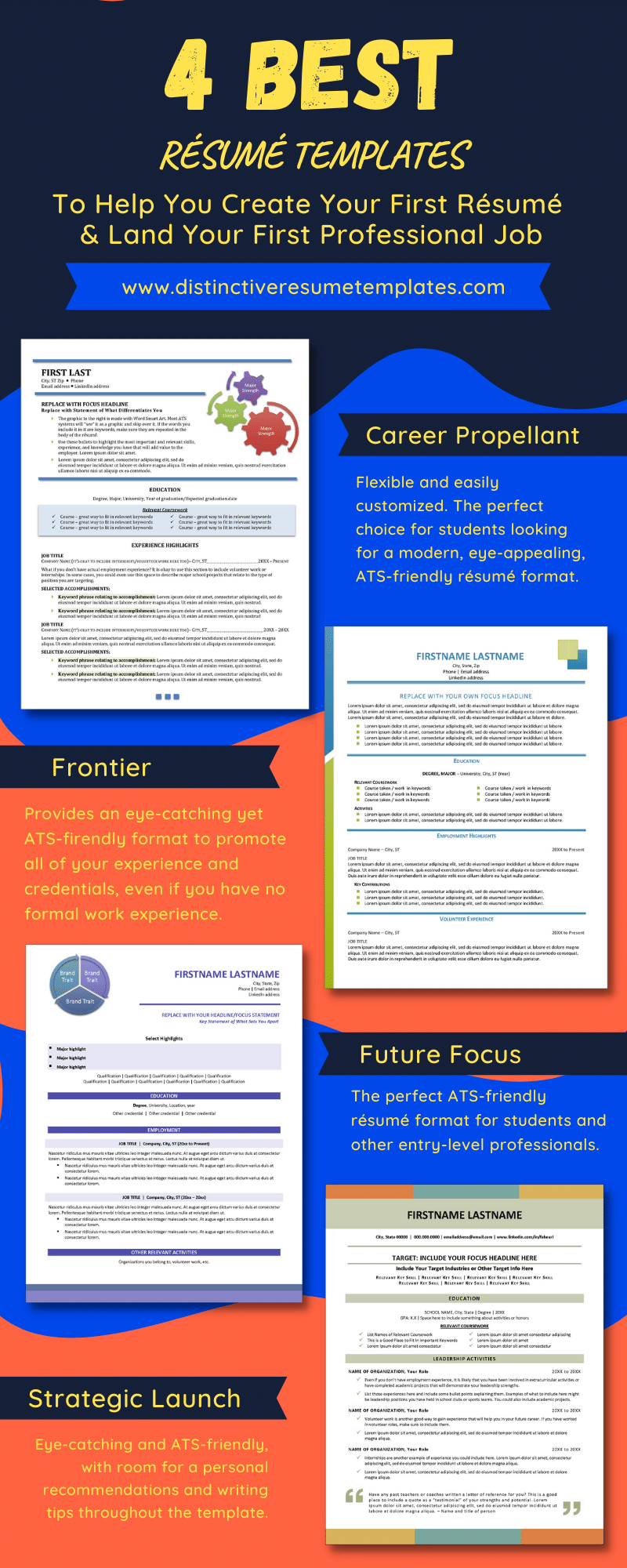
Choose the Best Resume Format
Imagine your resume as a pyramid. The most important experience should be at the top (beginning), and this should work down to the least important experience (bottom).
If you are writing a resume with no experience, this might seem difficult, but go back to the last tip and remember that it doesn’t matter whether you gained your experience in a paid job. What matters is just that you’ve gained it.
While you might hear that a functional resume format is always the way to go when writing a resume with no experience, this may not always be true. Most employers prefer a reverse chronological order to a functional one. Ultimately, the best resume format for you will be the one that does the best job of promoting your skills and any experience that you do have, even if that experience was gained outside of paid employment.
How Many Pages?
Typically, the first resume you write as a graduating student or other entry-level applicant will be one page. This isn’t an unbreakable rule if you have relevant experience that will fill two pages. But in almost all cases, you should start with one page.
At the top of your resume include your name and contact information, followed by all the content that will prove to the employer you are the best person for the job.
Place Your Education Section Near the Top
For someone with no experience, this often means that your education is one of your most important qualifications. For this reason, you will want to list your education near the top of the resume. As part of your education section, consider including school projects, extracurricular activities, academic achievements and awards (e.g., dean’s list, magna cum laude, or summa cum laude), participation on a sports team, or other leadership experiences such as school government or student council roles. This advice is equally true for high school students as it is for college students.
Even if you haven’t yet earned a degree, include a listing with your field of study and expected graduation date. If you have taken any other relevant training or certification programs, including online courses, include those too.
Other Paid or Unpaid Experience
Follow your education listing with any other experience, such as volunteer jobs, internships, or part-time jobs. As you gain more work experience, you will reverse this resume format and list your education at the end of the resume.
Studying the resume templates in this infographic will give you a good idea of the typical format for your first resume. Often this would include the following sections:
- Your Name & Contact Info
- A Headline Focus Statement
- Summary of Qualifications
- Education
- Experience Section (Paid or Unpaid)
- Other important skills such as foreign languages and language proficiency, public speaking, or computer technical skills can be listed in additional sections, usually near or at the end of your resume.
All Experience, Paid or Unpaid, Is Important
As you write your first resume, remember that what matters most is that you have the ability to be valuable to your next employer. The skills that will allow you to be valuable may have been developed outside of a paid job. If you have relevant employment experience, include it. If not, include other unpaid experience. Some ideas of what to put on your resume include:
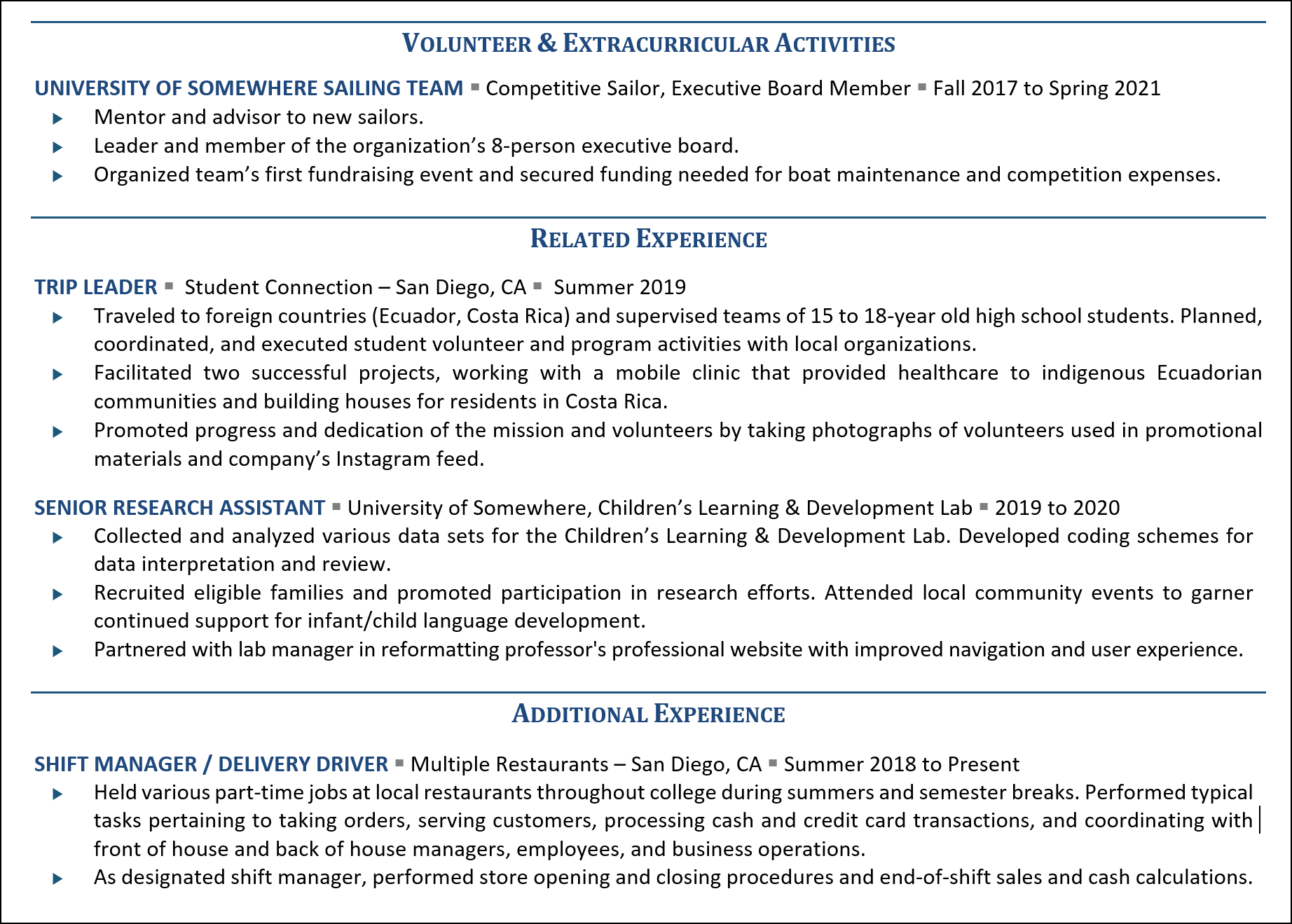
In this excerpt from the professionally created resume for a graduating student, you can see an example of how you can include unpaid experience on your resume.
Focus on Accomplishments
Also, always write your resume to focus on accomplishments. It’s often said that “past performance is the best predictor of future results.” Hiring managers can get a sense of what you can do for them by what you’ve accomplished in the past. So, as you write your resume, phrase it to focus on the results and benefits you have produced. Begin each bullet point with an action verb.
Here is an example excerpt from the resume written for a graduating student. Notice how everything is written in terms that emphasize the value and benefit of her work.

Make Sure It Is ATS-Friendly
Most large employers and many smaller ones use applicant tracking systems (ATS) to store resumes and track applicants through the hiring process.
No matter how you conduct your job search, the odds are that an employer will enter your resume into an ATS. Therefore, you must ensure your resume is ATS-friendly so that it can be entered properly and then later searched by keywords to recall it.
This is another good reason NOT to go it alone. ATS standards are constantly advancing and are hard to keep up with. You might read a blog post just a couple of years old explaining ATS requirements that are already outdated. However, our writing team at Distinctive Career Services is trained continuously to understand and adhere to ATS standards.
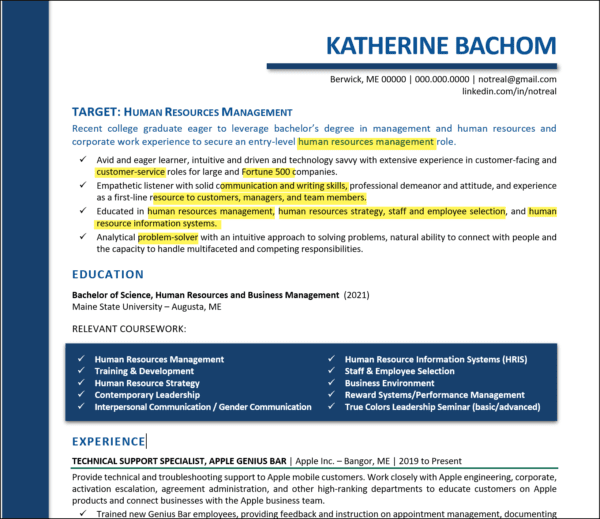 Include the Right Keywords
Include the Right Keywords
When you submit your job application, the performance of your resume in an ATS has as much to do with how keyword-rich the content is as with the structure of your resume. After your resume is entered into an ATS, it will be pulled out only when it includes the keywords in the keyword search.
Earlier, we suggested reviewing job announcements to learn what employers were looking for in applicants. Reviewing each job ad like this is also a great way to learn the job requirements and, thus, the keywords the recruiter might use when searching the ATS. You will want to include these specific words and phrases in your resume.
This excerpt of an example resume for a recent graduate applying for HR positions shows a technique for using education experiences to boost the number of keywords you can include in your first resume.
This HR management candidate would have had few HR-related keywords if we’d relied on just her Apple store part-time work experience. However, by listing courses she had taken in her field (in the blue section) and emphasizing her education in the qualifications summary (the keywords are highlighted in yellow), her resume performed well in keyword searches.
Proofread Carefully, Then Proofread Again
Last but not least, print your resume, set it aside for at least a day, and then come back and read it with a fresh set of eyes. During this second-day review, look for misspellings, inaccuracies in job titles and dates of employment, and grammatical errors.
Crafting a Cover Letter With No Work Experience
When you’re stepping into the job market for the first time, just like writing your first-time resume, crafting a compelling cover letter might seem like a challenge. This is especially true when you have no formal work experience to draw upon. However, this is your opportunity to showcase your potential, enthusiasm, and the skills you’ve acquired through other means. Here’s how to approach writing a cover letter that stands out, even without traditional job experience.
Highlight Transferable Skills and Learning Experiences
Begin by identifying transferable skills and experiences from your education, volunteer work, extracurricular activities, or any personal projects that are relevant to the job you’re applying for. Skills such as communication, leadership, problem-solving, and teamwork are highly valued in almost every profession. Use specific examples to demonstrate how you’ve developed and applied these skills. For instance, leading a group project at school showcases leadership, organization, and teamwork, all of which are applicable in a professional setting.
Demonstrate Your Enthusiasm and Commitment
Employers understand that everyone starts somewhere, and many are open to hiring candidates with the right attitude and a willingness to learn. Express your genuine enthusiasm for the role and the company. Explain why you’re drawn to this particular job and how you align with the company’s values or mission. This shows that you’re not just looking for any job but that you’re interested in growing with their organization.
Leverage Your Academic Achievements
Without work experience, your academic achievements can serve as a testament to your work ethic and ability to meet goals. Highlight any honors, awards, or significant projects that demonstrate your capability and dedication. If you’ve taken courses directly relevant to the job or industry, mention these as well to show that you have foundational knowledge and are eager to build upon it.
Show How You Can Add Value
Research the company and the specific role to understand what challenges they face or what goals they’re aiming to achieve. Use your cover letter to suggest how you can contribute to these objectives, even in a small way. This proactive approach can be very appealing to employers, as it demonstrates your initiative and problem-solving skills.
Closing with a Forward-Looking Statement
In your concluding paragraph, reiterate your enthusiasm for the opportunity and express your eagerness to contribute to the team. Indicate your willingness to learn and adapt, highlighting that while you may not have direct work experience, you are ready and capable of taking on the challenges of the role. Invite the employer to discuss further how you can contribute to their team, showing that you’re proactive and serious about the opportunity.
By focusing on your transferable skills, academic achievements, and the unique perspectives you bring, your cover letter can make a strong impression, even without traditional work experience. Remember, your goal is to show potential employers that what you lack in experience, you make up for in enthusiasm, potential, and willingness to learn and grow.
Final Thoughts
If you are overwhelmed by the idea of how to put these principles into action and write your first resume, our best advice is to work with one of the certified professional resume writers on the Distinctive Career Services team. We are here to help you! Just schedule a free resume writing consultation to learn more and get all your questions answered.
The time and money you invest in having your resume professionally prepared may not only shorten your job search and help you land the interview. It can give you confidence by arming you with a powerful job search tool that can help the interviewer discover you’re exactly what the company needs!
Frequently Asked Questions
What is a resume with no experience?
A resume with no experience is a document that showcases your skills, education, and other relevant experiences, even if you haven’t had a formal job before. It’s a marketing tool to show potential employers that you’re the best choice for a job, even without traditional work experience.
How can I write a resume if I have no work experience?
Start by focusing on the job you’re targeting and learn what skills and qualifications are needed for that job. Highlight your education, extracurricular activities, volunteer work, and any other relevant experiences. Remember, your resume should promote how you are the best choice for the job, even if you don’t have formal work experience.
What should I include in my resume if I don't have any job experience?
If you don’t have job experience, you can include your education, any volunteer work you’ve done, extracurricular activities, and any skills you’ve developed that are relevant to the job you’re applying for. Remember, all experience, whether paid or unpaid, is important.
How can I make my resume attractive if I have no experience?
First impressions matter, so make sure your resume is visually appealing. Use a professional resume template designed for entry-level workers. Also, focus on your accomplishments and use action verbs to describe what you’ve done.
How can I make sure my resume gets noticed by hiring managers?
To ensure your resume gets noticed, make sure it’s ATS-friendly and includes the right keywords. Review job announcements to learn what employers are looking for and include those keywords in your resume. Also, proofread your resume carefully for any errors.
How long should my resume be if I have no experience?
Typically, your first resume should be one page long. This isn’t an unbreakable rule, but in most cases, you should start with one page. As you gain more experience, your resume can become longer.


